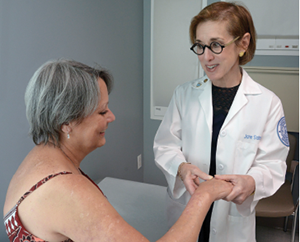“Dialogues between physicians caring for SLE patients and social workers who lead the program identify key patient needs and provide information which can be conveyed to patients by peers, so it is more easily accepted,” Dr. Salmon says. For example, a focus on increasing access to high-quality reproductive health counseling and care may decrease the frequency of serious pregnancy complications associated with becoming pregnant when SLE disease activity is not well controlled.
Social workers provide support to patients who are managing anxiety and cultural issues. By serving as a buffer, they can help increase trust and adherence between patients and their care team. For example, a patient may be hesitant to tell their rheumatologist that they are supplementing their treatment program with herbs. “But it’s important to share that with their doctor, because there could be an interaction,” Ms. Rose says.
The program also hosts special events in which HSS staff can become better acquainted with patients and their families. “This helps to build trust and makes patients feel more comfortable about opening up about their barriers to adherence,” Ms. Rose says.
Social workers provide support to patients who are managing anxiety & cultural issues. By serving as a buffer, they can help increase trust & adherence between patients & their care team.
LANtern (Lupus Asian Network)

Dr. Salmon examines a patient.
This may be the only national, hospital-based support and education program dedicated to serving Asian Americans with lupus and their families. “Perceptions about lupus being fatal, societal stigma, language and cultural beliefs, and traditions should be considered when implementing a care plan to avoid barriers and challenges to care,” Dr. Salmon says.
The social work senior manager who leads LANtern provides specifically tailored community programs for Asian lupus patients, and they collaborate with other healthcare professionals and community organizations to enhance awareness, empower patients and provide support and tools to patients and their families to better manage the disease.
LupusLine
This free telephone counseling service provides one-to-one support for people with lupus. It is the only national, hospital-based telephone peer support program that links people who are referred to the service with trained volunteers who have lupus. “Veteran peer counselors are supervised by a social work manager,” Dr. Salmon says. “Patients learn from others with the condition in a way that they cannot learn from their healthcare professionals.”
“The program’s success depends upon the social worker’s ability to closely match patients with particular concerns with counselors who may have had those same medical or social life experiences,” Ms. Rose says. “A peer counselor can help normalize a situation.” The program has now expanded globally via the Internet.
Teen & Parent Lupus Chat Groups
Monthly in-person chat groups for teens and their parents provide a place to discuss lupus-related issues and identify with their peers. For parents, it provides a community for managing the illness’ unpredictability.


